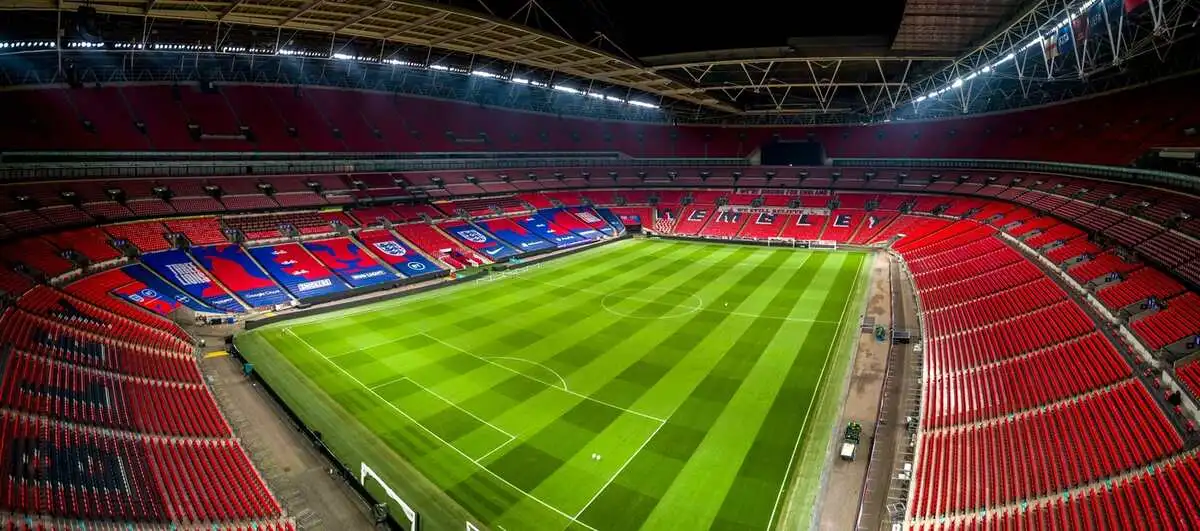Wembley Stadium stands as one of the most iconic sporting arenas in the world, symbolizing England’s rich football heritage and serving as a venue for some of the greatest moments in sports history. Its construction and the legendary games hosted within its walls solidified its place as a global landmark. Let’s take a closer look at how this marvel of modern engineering was built and the major games that have etched their mark on its storied timeline.
Building Wembley: A Monumental Feat
- Total Cost: £798 million (approximately $1.57 billion)
- Construction Period: 2002 to 2007
- Number of Workers: 3,500 at peak construction
- Seating Capacity: 90,000
- Stadium Height: 133-meter-high steel arch
- Project Architects: Foster and Partners & Populous

Architectural Design and Engineering Marvel
Designed by the internationally renowned architectural firms Foster and Partners and Populous, Wembley Stadium was envisioned to be more than just a place for football matches. One of its most remarkable features is the 133-meter-high steel arch that dominates the London skyline. This iconic arch is not just a symbol of the stadium’s grandeur but also serves a practical purpose — supporting the retractable roof. The roof, while retractable, cannot cover the pitch fully, but the design allows natural light to flood the stadium, ensuring optimal conditions for the turf.
With a seating capacity of 90,000, Wembley is the largest stadium in the United Kingdom and the second-largest in Europe. Its scale and versatility mean it’s capable of hosting football matches, concerts, and other large-scale events. The pitch, adaptable for various sports and concerts, includes a specialized cooling system underneath the grass. This system is designed to maintain ideal playing conditions, no matter the weather.
The Construction Process
Building Wembley was a massive undertaking. Over 3,500 workers were involved at the peak of construction, contributing to the completion of this monumental project. Every aspect of the new design was thought out in great detail, ensuring it surpassed its predecessor in every possible way. The old Wembley, famous for its Twin Towers, had been a historical landmark, but the new design’s modern features, including the imposing arch, ensured that the legacy continued in a contemporary fashion.
The construction wasn’t without its challenges. Due to the complex design and the high standards required, there were delays that pushed the initial completion date from 2005 to 2007. However, the result was a stadium that not only stands as an architectural masterpiece but also as a functional and adaptable venue capable of hosting events for decades to come.
Major Games and Events at Wembley
Since reopening in 2007, Wembley Stadium has hosted a series of unforgettable matches and events that have further cemented its place in sports history. Here are some of the most significant moments:
1. FA Cup Finals
Wembley has been synonymous with the FA Cup, and the tradition continued in the new stadium. The first FA Cup Final held at the new Wembley took place in 2007, where Chelsea triumphed over Manchester United with a 1-0 victory. Since then, it has been home to the final, making it one of the most important annual events in the English football calendar.
2. UEFA Champions League Finals (2011 & 2013)
Wembley has twice been the stage for the UEFA Champions League final. In 2011, FC Barcelona defeated Manchester United in a thrilling match, and two years later, Bayern Munich emerged victorious over Borussia Dortmund in an all-German final. These two high-profile events showcased Wembley’s ability to host some of the biggest football matches on the planet.
3. England’s National Football Team Matches
As the home of England’s national football team, Wembley has hosted numerous friendlies, qualifiers, and competitive matches. One of the most memorable was England’s victory over Croatia in 2021, securing their place in the UEFA European Championship final.
4. 2020 UEFA Euro Final
Perhaps one of the most dramatic moments in Wembley’s recent history was the UEFA Euro 2020 final, held in 2021 due to the pandemic. The match saw England face Italy in a tense showdown, which ultimately ended in a penalty shootout. Italy claimed the victory, but the event was a reminder of Wembley’s significance on the global stage, with nearly 60,000 fans in attendance.
5. Olympic Games (2012)
Wembley played a role in the 2012 London Olympics, hosting several football matches, including both the men’s and women’s finals. This event further demonstrated the stadium’s versatility as a world-class venue for various sporting events.
Beyond Football: Wembley’s Role in Other Events
While football remains the stadium’s main attraction, Wembley has evolved into a venue that accommodates a variety of sports and entertainment events. The NFL International Series, which brings American football to London, has become a regular fixture at Wembley, offering British fans a taste of American sports. Iconic boxing matches, such as those involving Anthony Joshua, have also taken place at the stadium, further broadening its appeal.
Wembley is also a hub for major concerts. Global superstars like Adele, Beyoncé, Coldplay, and Ed Sheeran have performed at the stadium, drawing in massive crowds. The acoustics and sheer size of the venue make it ideal for such large-scale musical events, ensuring that Wembley remains a prominent destination for both sports and entertainment.
The Legacy of Wembley Stadium
Wembley Stadium is more than just a venue — it’s a cultural landmark that reflects the spirit of sportsmanship and unity on a global scale. The architectural ingenuity, innovative construction techniques, and its storied history make it a symbol of excellence in the world of sports and entertainment. Each game, concert, or event hosted here adds to its legacy, further embedding Wembley into the memories of millions of fans around the world.
From hosting legendary football matches to offering a platform for world-class performances, Wembley remains at the forefront of the global stage. As it continues to be a site for future sporting events and concerts, its reputation only grows, ensuring its place as one of the world’s most revered stadiums.


